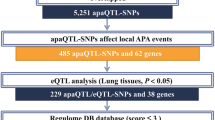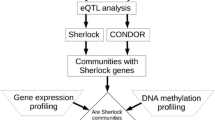Abstract
Assessing the association between candidate single-nucleotide polymorphisms (SNPs) identified by multi-omics approaches and susceptibility to silicosis. RNA-seq analysis was performed to screen the differentially expressed mRNAs in the fibrotic lung tissues of mice exposed to silica particles. Following this, we integrated the SNPs located in the above human homologenes with the silicosis-related genome-wide association study (GWAS) data to select the candidate SNPs. Then, expression quantitative trait locus (eQTL)-SNPs were identified by the GTEx database. Next, we validated the associations between the functional eQTL-SNPs and silicosis susceptibility by additional case–control study. And the contribution of the identified SNP and its host gene in the fibrosis process was further validated by functional experiments. A total of 12 eQTL-SNPs were identified in the screening stage. The results of the validation stage suggested that the variant T allele of rs419540 located in IL12RB1 significantly increased the risk of develo** silicosis [additive model: odds ratio (OR) = 1.78, 95% confidence interval (CI) 1.11–2.85, P = 0.017]. Furthermore, the combination of GWAS and the results of validation stage also indicated that the variant T allele of rs419540 in IL12RB1 was associated with increased silicosis risk (additive model: OR = 2.07, 95% CI 1.38–3.12, P < 0.001). Additionally, after knockdown or overexpression of IL12RB1, the levels of pro-inflammatory factors, such as IL-12, IFN-γ, and other pro-inflammatory factors, were correspondingly decreased or increased. The novel eQTL-SNP, rs419540, might increase the risk of silicosis by modulating the expression levels of IL12RB1.






Similar content being viewed by others
Data availability
The datasets generated during and/or analysed during the current study are not publicly available but are available from the corresponding author on reasonable request.
References
Allen RJ, Guillen-Guio B, Oldham JM et al (2020) Genome-Wide Association Study of Susceptibility to Idiopathic Pulmonary Fibrosis. Am J Respir Crit Care Med 201(5):564–574. https://doi.org/10.1164/rccm.201905-1017OC
Chu M, Ji X, Chen W et al (2014) A genome-wide association study identifies susceptibility loci of silica-related pneumoconiosis in Han Chinese. Hum Mol Genet 23(23):6385–6394. https://doi.org/10.1093/hmg/ddu333
Chu M, Wu S, Wang W et al (2019) Functional variant of the carboxypeptidase M (CPM) gene may affect silica-related pneumoconiosis susceptibility by its expression: a multistage case-control study. Occup Environ Med 76(3):169–174. https://doi.org/10.1136/oemed-2018-105545
Denton CP, Khanna D (2017) Systemic sclerosis. Lancet 390(10103):1685–1699. https://doi.org/10.1016/S0140-6736(17)30933-9
Dong Z, Li R, Xu L et al (2020) Histone hyperacetylation mediates enhanced IL-1beta production in LPS/IFN-gamma-stimulated macrophages. Immunology 160(2):183–197. https://doi.org/10.1111/imm.13183
Edwards G (2019) Accelerated Silicosis-An Emerging Epidemic Associated with Engineered Stone. Comment on Leso, V. et al. Artificial Stone Associated Silicosis: A Systematic Review. Int. J. Environ. Res. Public Health 2019, 16 (4), 568, https://doi.org/10.3390/ijerph16040568. Int J Environ Res Public Health 16(7) https://doi.org/10.3390/ijerph16071179
Ford NR, Miller HE, Reeme AE et al (2012) Inflammatory signals direct expression of human IL12RB1 into multiple distinct isoforms. J Immunol 189(9):4684–4694. https://doi.org/10.4049/jimmunol.1200606
Guan Q, Ma Y, Hillman CL et al (2011) Targeting IL-12/IL-23 by employing a p40 peptide-based vaccine ameliorates TNBS-induced acute and chronic murine colitis. Mol Med 17(7–8):646–656. https://doi.org/10.2119/molmed.2010.00252
Hoy RF, Chambers DC (2020) Silica-related diseases in the modern world. Allergy 75(11):2805–2817. https://doi.org/10.1111/all.14202
Huang X, Liu W, Yao Y, Wang D, Sun Y, Chen W (2023) 30-year trends in the disease burden, incidence, and prevention of pneumoconiosis. China CDC Wkly 5(38):856–860. https://doi.org/10.46234/ccdcw2023.163
Karczewski KJ, Snyder MP (2018) Integrative omics for health and disease. Nat Rev Genet 19(5):299–310. https://doi.org/10.1038/nrg.2018.4
Konecny P, Ehrlich R, Gulumian M, Jacobs M (2018) Immunity to the dual threat of silica exposure and mycobacterium tuberculosis. Front Immunol 9:3069. https://doi.org/10.3389/fimmu.2018.03069
Leung CC, Yu IT, Chen W (2012) Silicosis. Lancet 379(9830):2008–2018. https://doi.org/10.1016/S0140-6736(12)60235-9
Levy C, Manns M, Hirschfield G (2023) New treatment paradigms in primary biliary cholangitis. Clin Gastroenterol Hepatol 21(8):2076–2087. https://doi.org/10.1016/j.cgh.2023.02.005
Li Z, Zhang W, Li S et al (2024) Integration of apaQTL and eQTL analysis reveals novel SNPs associated with occupational pulmonary fibrosis risk. Arch Toxicol. https://doi.org/10.1007/s00204-024-03734-1
Liu X, Jiang Q, Wu P, Han L, Zhou P (2023) Global incidence, prevalence and disease burden of silicosis: 30 years’ overview and forecasted trends. BMC Public Health 23(1):1366. https://doi.org/10.1186/s12889-023-16295-2
Lopez-Isac E, Bossini-Castillo L, Guerra SG et al (2014) Identification of IL12RB1 as a novel systemic sclerosis susceptibility locus. Arthritis Rheumatol 66(12):3521–3523. https://doi.org/10.1002/art.38870
Ma HY, Yamamoto G, Xu J et al (2020) IL-17 signaling in steatotic hepatocytes and macrophages promotes hepatocellular carcinoma in alcohol-related liver disease. J Hepatol 72(5):946–959. https://doi.org/10.1016/j.jhep.2019.12.016
Mayes MD, Bossini-Castillo L, Gorlova O et al (2014) Immunochip analysis identifies multiple susceptibility loci for systemic sclerosis. Am J Hum Genet 94(1):47–61. https://doi.org/10.1016/j.ajhg.2013.12.002
Pandey JK, Agarwal D (2012) Biomarkers: a potential prognostic tool for silicosis. Indian J Occup Environ Med 16(3):101–107. https://doi.org/10.4103/0019-5278.111746
Qu Y, Zhai R, Wang D et al (2023) Mitochondrial folate pathway regulates myofibroblast differentiation and silica-induced pulmonary fibrosis. J Transl Med 21(1):365. https://doi.org/10.1186/s12967-023-04241-0
Ragoussis J (2009) Genoty** technologies for genetic research. Annu Rev Genomics Hum Genet 10:117–133. https://doi.org/10.1146/annurev-genom-082908-150116
Salum KCR, Castro MCS, Nani ASF, Kohlrausch FB (2020) Is individual genetic susceptibility a link between silica exposure and development or severity of silicosis? A Systematic Review. Inhal Toxicol 32(9–10):375–387. https://doi.org/10.1080/08958378.2020.1825569
Sandborn WJ, Feagan BG, Fedorak RN et al (2008) A randomized trial of Ustekinumab, a human interleukin-12/23 monoclonal antibody, in patients with moderate-to-severe Crohn’s disease. Gastroenterology 135(4):1130–1141. https://doi.org/10.1053/j.gastro.2008.07.014
Schroder K, Hertzog PJ, Ravasi T, Hume DA (2004) Interferon-gamma: an overview of signals, mechanisms and functions. J Leukoc Biol 75(2):163–189. https://doi.org/10.1189/jlb.0603252
Stark R, Grzelak M, Hadfield J (2019) RNA sequencing: the teenage years. Nat Rev Genet 20(11):631–656. https://doi.org/10.1038/s41576-019-0150-2
Teng MW, Bowman EP, McElwee JJ et al (2015) IL-12 and IL-23 cytokines: from discovery to targeted therapies for immune-mediated inflammatory diseases. Nat Med 21(7):719–729. https://doi.org/10.1038/nm.3895
Trinchieri G (2003) Interleukin-12 and the regulation of innate resistance and adaptive immunity. Nat Rev Immunol 3(2):133–146. https://doi.org/10.1038/nri1001
Tziastoudi M, Theoharides TC, Nikolaou E, Efthymiadi M, Eleftheriadis T, Stefanidis I (2022) Key genetic components of fibrosis in diabetic nephropathy: an updated systematic review and meta-analysis. Int J Mol Sci 23:23. https://doi.org/10.3390/ijms232315331
Verstockt B, Salas A, Sands BE et al (2023) IL-12 and IL-23 pathway inhibition in inflammatory bowel disease. Nat Rev Gastroenterol Hepatol 20(7):433–446. https://doi.org/10.1038/s41575-023-00768-1
Wu Q, Jiao B, Zhang Q, ** C, Yu H, Wang F (2023) Identification of circRNA expression profiles and the potential role of hsa_circ_0006916 in silicosis and pulmonary fibrosis. Toxicology. https://doi.org/10.1016/j.tox.2022.153384
**ang M, Liu T, Tian C et al (2022) Kinsenoside attenuates liver fibro-inflammation by suppressing dendritic cells via the PI3K-AKT-FoxO1 pathway. Pharmacol Res. https://doi.org/10.1016/j.phrs.2022.106092
Yarmolinsky J, Robinson JW, Mariosa D et al (2024) Association between circulating inflammatory markers and adult cancer risk: a Mendelian randomization analysis. EBioMedicine. https://doi.org/10.1016/j.ebiom.2024.104991
Yu Y, Mao L, Cheng Z et al (2021) A novel regQTL-SNP and the risk of lung cancer: a multi-dimensional study. Arch Toxicol 95(12):3815–3827. https://doi.org/10.1007/s00204-021-03170-5
Zhao S, Fung-Leung WP, Bittner A, Ngo K, Liu X (2014) Comparison of RNA-Seq and microarray in transcriptome profiling of activated T cells. PLoS ONE. https://doi.org/10.1371/journal.pone.0078644
Zhao X, Wu Y, Li J et al (2019) JNK activation-mediated nuclear SIRT1 protein suppression contributes to silica nanoparticle-induced pulmonary damage via p53 acetylation and cytoplasmic localisation. Toxicology 423:42–53. https://doi.org/10.1016/j.tox.2019.05.003
Zhou Y, Zhang Y, Zhao R et al (2021) Integrating RNA-Seq With GWAS reveals a novel SNP in immune-related HLA-DQB1 gene associated with occupational pulmonary fibrosis risk: a multi-stage study. Front Immunol. https://doi.org/10.3389/fimmu.2021.796932
Acknowledgements
The authors wish to thank all the study participants, research staff, and students who participated in this work.
Funding
This work was supported by the National Key Research and Development Program of China (2022YFC2503202), Top Talent Support Program for Young and Middle-Aged People (HB2023099), and Natural Science Foundation of Jiangsu Province (BK20211038).
Author information
Authors and Affiliations
Corresponding authors
Ethics declarations
Conflicts of interest
The authors declared no potential conflict of interest.
Ethics statement
The studies involving human participants were reviewed and approved by the Ethics Committee of Nantong University (Approval No. 2020-002). The patients/participants provided their written informed consent to participate in this study.
Additional information
Publisher's Note
Springer Nature remains neutral with regard to jurisdictional claims in published maps and institutional affiliations.
Supplementary Information
Below is the link to the electronic supplementary material.
Rights and permissions
Springer Nature or its licensor (e.g. a society or other partner) holds exclusive rights to this article under a publishing agreement with the author(s) or other rightsholder(s); author self-archiving of the accepted manuscript version of this article is solely governed by the terms of such publishing agreement and applicable law.
About this article
Cite this article
**, C., Tao, X., Zhang, W. et al. Multi-omics and multi-stages integration identified a novel variant associated with silicosis risk. Arch Toxicol (2024). https://doi.org/10.1007/s00204-024-03795-2
Received:
Accepted:
Published:
DOI: https://doi.org/10.1007/s00204-024-03795-2




